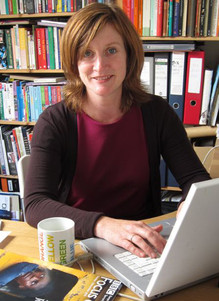
Because I like living on the edge... Seriously though, when I moved back to the UK after working full time in South Africa for a few years, I was pregnant with my first child. In South Africa I had been senior staff reporter on a national newspaper, Business Day, and prior to that I was news editor of a weekly trade magazine, Computerweek. As my husband is also self-employed and often works away it seemed an obvious time to start freelancing. This gave me the flexibility to work when and where I wanted while juggling the demands of childcare.
If you trained, where? If not, how did you become a freelancer?
A Bachelor of Arts, a law degree and a diploma through the London School of Journalism did not help prepare me for life as a full time freelancer. However, I’ve always enjoyed writing and before making the leap I had already published a number of freelance articles; the experience of working as a full time a journalist certainly helped. In fact, the newspaper I worked on in South Africa was 50 per cent owned by Pearson and this connection helped me secure my first freelance contract in the UK with the FT business title Investor’s Chronicle. The editor at the time was forward thinking enough to be able to "accommodate a pregnant woman".
Do you specialise in any particular field and what areas do you write about?
A generalist is how I describe myself but there are a few core threads in my work. Right now I am particularly interested in anything related to doing business in Africa. However, a strong focus throughout my career has been in telecoms, IT and broadcasting. I helped launch a specialist newsletter in this space but eventually the world of freelance beckoned and decided to sell my stake in that business. Over the years I’ve written on everything from healthcare to parenting, finance, manufacturing and mining for mainstream and niche, online and print media.
Which publications have you been published in?
BBC Focus on Africa, The Observer, Global Telecoms Business, Computing, Telecom Markets, Computing Business, Practical Parenting, The Practising Midwife, That’s Life, The Mail & Guardian, The Korea Herald, Eve Magazine, Investor’s Chronicle, PolicyTracker, The Meridian, TNT magazine, Intermedia, The Miner Diaries. In addition I regularly produce content for Economist Intelligence Unit reports, case studies, blogs and websites and have helped produce corporate reports and/or blogs for Greenwich Consulting, Fleet Street Publications, UKtradeinvest, greenbang.com and bettercitiesnow.com.
Which articles, in which publication, are you the most proud of?
The articles published in the Observer’s Sunday magazine, Life, and the Practising Midwife about the complications I experienced during pregnancy and childbirth that nearly claimed both my own and my daughter’s life. More recently the more investigative work I have done for BBC Focus on Africa feels like a worthwhile contribution to raising awareness about challenges and opportunities facing African governments, the companies doing business there and its people.
What are the best and worst aspects of freelancing?
The diversity of the work means life is never dull and the flexibility to work when, where, how and on what probably the biggest bonus. As well as contributing to the BBC magazine Focus on Africa, ever quarter I spend two weeks there in the office sub-editing. This gives me the buzz of office camaraderie but is also reminder of why I enjoy freelancing. The downside, as all freelancers will agree, is the financial insecurity, growing trend towards underpayment and the rejections which can manifest in extreme self-doubt.
Do you have any interesting anecdotes in relation to your experience as a freelancer?
In 2003, after a night out with a friend in London, I was innocently reading my book on the tube when a twenty-something couple handed me a note with an email address and the words "three's a charm" scribbled across it. As a freelancer one is compelled to find a story in everything and so I could not resist emailing what turned out to be a couple of young Canadian swingers to find out more. Apparently I looked like somebody who might be up for it! On the same night I pitched the story to a woman's magazine; it was the fastest response and commission I have every received from an editor proving without doubt that sex does indeed sell. The couple agreed to be interviewed and the story ended up on the cover of Eve magazine
Free daily newsletter
If you like our news and feature articles, you can sign up to receive our free daily (Mon-Fri) email newsletter (mobile friendly).









